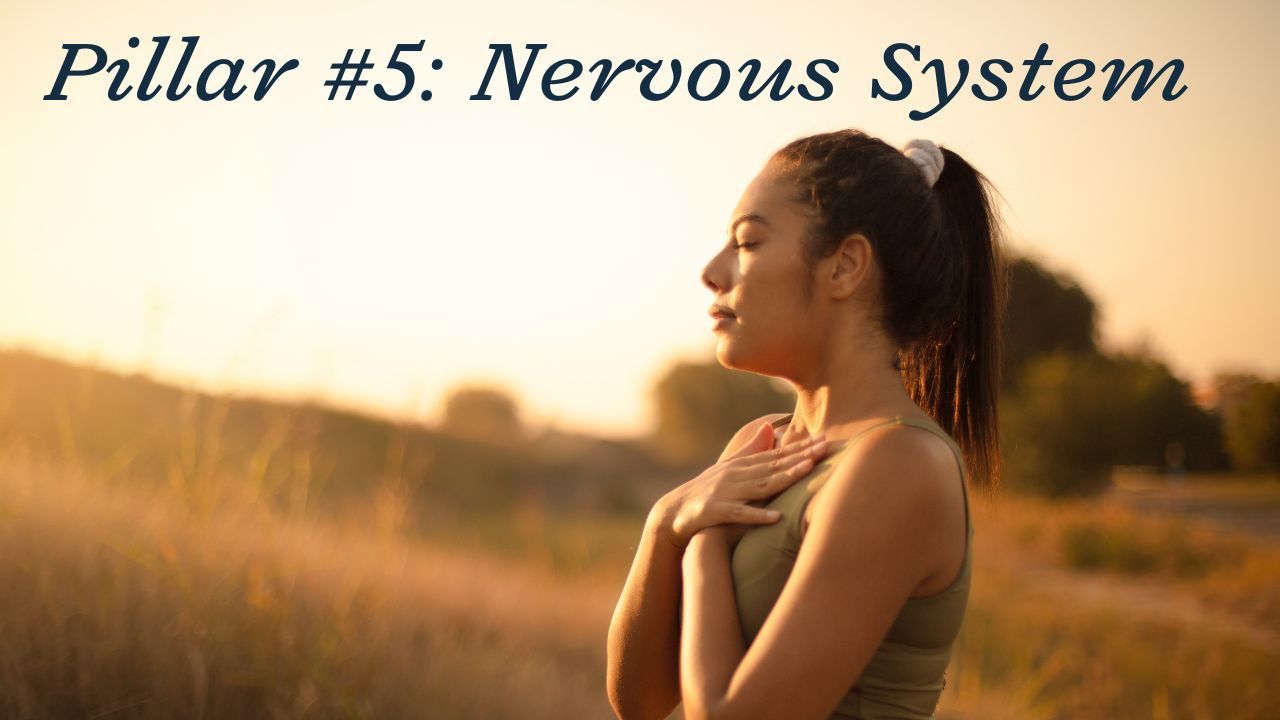The Pillar of the Nervous System: Stress Recovery & Resilience
Jul 09, 2025
We’ve made it to the final blog post in our Foundational Pillars series, and this one is all about the nervous system—an essential, often overlooked part of our health that plays a critical role in how we feel, heal, and function day to day.
When we talk about nervous system regulation, we’re referring specifically to the autonomic nervous system (ANS). The ANS is divided into two key branches:
- Sympathetic Nervous System – often called "fight-or-flight"
- Parasympathetic Nervous System – known as "rest-and-digest," or more holistically, "rest, digest, heal, and reproduce"
Both branches are necessary, but modern life tends to keep us stuck in a sympathetic-dominant state. The goal of nervous system support is to bring balance, helping our bodies spend more time in the parasympathetic mode so that we can heal, digest, sleep, and regulate effectively.
What Happens When We’re Stuck in Fight or Flight?
Staying stuck chronically in fight-or-flight can have far-reaching impacts. Over time, it can contribute to:
- High blood pressure (hypertension)
- Digestive issues like IBS, constipation, or reflux
- Sleep disturbances
- Weakened immune function
- Mental health concerns, including anxiety and panic attacks
- Fatigue and burnout
- Hormone imbalances (yes, cortisol affects your other hormones too!)
It's hard to measure exactly how much stress is affecting our bodies, but we do know that living in a chronically stressed state is energetically and nutritionally expensive. It pulls resources away from rest, recovery, and reproduction—and toward survival mode.
At our clinic, we don’t necessarily aim to eliminate stress, but we focus on completing the stress cycle. That means helping your body discharge the stress it's carrying so that it doesn’t build up and contribute to burnout or disease. Let’s talk about some ways we can do this.
Supporting Your Nervous System Daily
We recommend building a toolkit of strategies you can pull from in different situations. Exercise is a great one—but we also want tools that are accessible in the car, at your desk, or during a quick 5-minute break.
Here are a few of our favorites:
Deep Breathing
One of the fastest ways to shift your nervous system.
- Try the 5-6-8 breathing technique: Inhale for 5 seconds, hold for 6, exhale for 8.
- Do this for 1–2 minutes once or twice a day (or anytime you feel dysregulated).
Humming, Singing, or Gargling
These stimulate the vagus nerve, which directly supports the parasympathetic system.
- Sing in the car, hum while doing chores, or gargle water for 30–60 seconds twice daily.
Get Sunlight Daily
Sunlight supports circadian rhythm, vitamin D production, and mood.
- Aim for 10–20 minutes of natural light daily (preferably in the morning!).
Body Scans and Mindfulness
Use your senses to reconnect with the present moment.
- Try a body scan: Starting at your toes, move your attention slowly up your body, observing sensations without judgment.
- Acknowledge sounds, smells, and textures around you. Just notice—no need to fix or change anything
A Note on Exercise and the Nervous System
While movement is fantastic for stress relief, not all movement is restorative when your nervous system is already taxed.
If you feel wiped out after a workout and struggle to recover, that’s a sign your nervous system may need gentler support.
Some forms of nervous-system-friendly movement include:
- Walking (especially in nature)
- Yoga or gentle stretching
- Pilates
- Tai chi or qigong
- Dancing
- Swimming or water aerobics
- Light strength training
- Low-intensity cycling
- Hiking
And when your energy is up and stress is managed, you can layer in more intensity. The key is to listen to your body’s signals and respect its limits.
We also have some supplements that can help support nervous system regulation if our recovery mechanisms aren’t quite cutting it during acutely stressful periods. Supplements we have found success with include:
- Ashwagandha
- L-theanine
- Combined preparations– like Cortisol Manager (found here for 15% off)
Closing Thoughts
Your nervous system is the foundation of how you experience the world—it impacts your digestion, mood, energy, hormones, sleep, and even your relationships. Supporting it doesn’t have to be complicated, but it does require intentionality.
If you've been feeling overwhelmed, anxious, burnt out, or just "off," it could be your nervous system asking for attention. The good news? You don’t have to overhaul your life. Just a few minutes a day of focused support can make a real difference.
This wraps up our Foundational Pillars series. We hope it’s helped you connect the dots between your everyday habits and your overall well-being. As always, we’re here to support you on your journey of health and wellness.
**We may earn from qualifying purchases.
Check out all of the services offered at Uplift For Her!
Stay connected with more tips and updates!
Join our mailing list to receive the latest news and updates from our team.
Don't worry, your information will not be shared.
We hate SPAM. We will never sell your information, for any reason.

